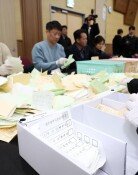[Opinion] On Distortion of History
[Opinion] On Distortion of History
Posted January. 11, 2004 23:19,
Chinese academic circles offended Koreans by claiming the history of Goguryu, where Koreans once had ruled Manju as a part of its history. But precisely speaking, the northern part of China, as well as Manju, has not been an impregnable fortress of the Han race, and many nations built by other races such as Bukwi, Yo, Keum, Won and Cheong had ruled the country. Those four nations except Won were built by the Manju race. So it might be said that the Hans owe much to the Manjus with respect to Chinas broad territory, considering contributions of emperor Kanghee in the early Cheong Dynasty. The Hans rule on Manju is less than 800 years at most.
Due to the large population of the Han people, China became a huge country including 55 minor races as if the sea absorbs all streams and rivers. That does not mean the entire history of the Manju that has many branches is absorbed into the history of the Han. Neither does the history of Goguryu. In this sense, Chinas claim gives a good lesson to Koreans who used to think that only the Japanese made such distortions of history. History is written by the Law of the Jungle.
This situation is based on Chinas growing national power both militarily and economically and wielding its influence supported by it overcoming its lost traditional supremacy for the last 150 years due to foreign invasion. When a nation is rich and powerful inside, it tends to expand its power outside. Many historic lessons show that local and international wars break out by it, regardless of time and place. There are some in Korea who see being out of American influence is the end of unhappiness and beginning of happiness and the end of subordination and beginning of independence. However, it does not work for us who lives near powerful countries such as China, Japan, and Russia. We must have wisdom to thrive as well as survive by bringing the U.S. power as a way of guarding ourselves.
There are people who distort history even among Koreans. Some examples of this include a hagiography on Kims family of North Korean regime, its claim that the Korean war began by the Souths northward invasion, and many events interpreted through revisionism since the countrys restoration of independence and worship of martyrs appeared frequently on demonstrations. Historical distortions happen everywhere. The nations power should be cultivated. So should Honesty.
Kim Byung Ju, a professor of Sogang University and a guest editorial writer.
pjkim@ccs.sogang.ac.kr







